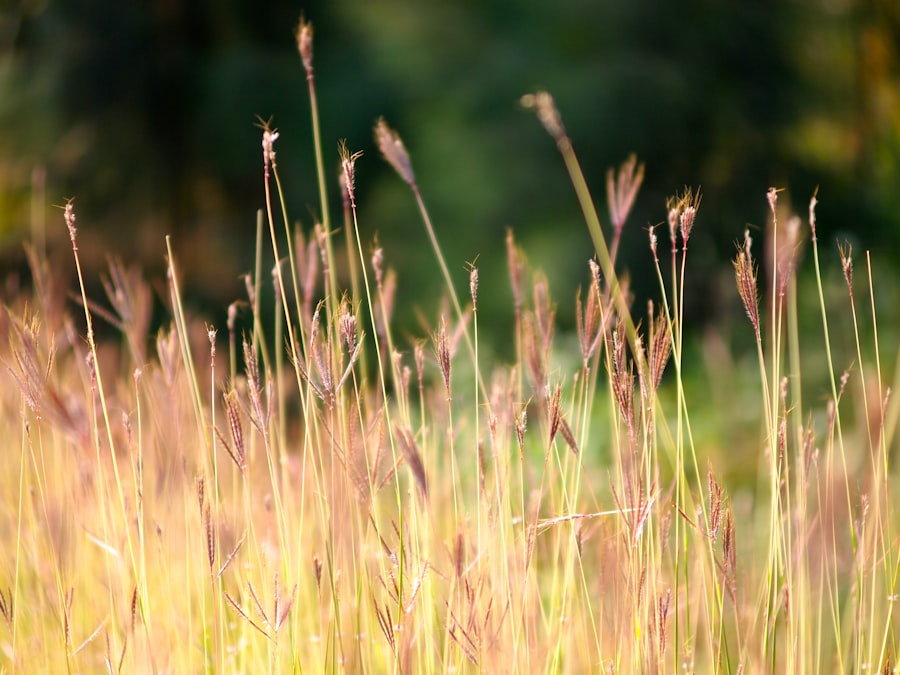Grass plays a vital role in the natural habitat of chickens and offers multiple advantages for their health and welfare. It provides a source of mental and physical stimulation, allowing chickens to engage in natural behaviors such as pecking, scratching, and foraging. This activity helps prevent boredom and reduces the likelihood of negative behaviors within the flock, including feather pecking and aggression.
Grass also offers a soft, comfortable surface for chickens to walk and rest on, promoting better foot health and overall comfort. Nutritionally, grass is an important component of a chicken’s diet. It contains essential vitamins, minerals, and fiber that contribute to a balanced nutritional intake.
Chickens with access to grass can supplement their diet with insects, seeds, and other small organisms found in the grass, potentially improving the quality of their eggs and meat. The chlorophyll in grass can also enhance the color of egg yolks, making them more vibrant. These factors collectively contribute to the physical health and overall well-being of chickens in grass-rich environments.
Table of Contents
- 1 Alternatives to grass for chicken keeping
- 2 How grass impacts chicken health and behavior
- 3 The role of grass in a chicken’s diet
- 4 Managing a chicken coop without grass
- 5 Creating a chicken-friendly environment without grass
- 6 Balancing the need for grass with other factors in chicken keeping
- 7 FAQs
Key Takeaways
- Grass provides chickens with natural foraging opportunities, exercise, and a varied diet.
- Alternatives to grass for chicken keeping include providing access to dirt, sand, or other natural materials for scratching and dust bathing.
- Grass can positively impact chicken health by providing essential nutrients and promoting natural behaviors like pecking and scratching.
- Grass can be a valuable source of greens and insects for a chicken’s diet, contributing to overall health and egg quality.
- Managing a chicken coop without grass may require additional supplementation of greens, insects, and other natural materials to ensure a balanced diet and environment for the chickens.
Alternatives to grass for chicken keeping
Deep Litter System: A Grass-Free Alternative
One alternative is to provide chickens with a deep litter system in their coop. This involves layering the floor of the coop with materials such as straw, wood shavings, or dried leaves, which allows chickens to scratch and forage in a similar manner to how they would in grass. The deep litter system also provides insulation and helps to control odors and moisture in the coop.
Designated Foraging Areas
Another alternative to grass is to create a designated foraging area using materials such as sand or dirt. This area can be enriched with treats and scattered feed to encourage chickens to scratch and peck, providing them with mental stimulation and physical activity.
Perches, Platforms, and Toys: Combating Boredom
Additionally, providing chickens with access to a variety of perches, platforms, and toys within their coop can help to alleviate boredom and provide them with opportunities for exercise and play.
How grass impacts chicken health and behavior

The presence of grass in a chicken’s environment has a significant impact on their health and behavior. Chickens that have access to grass are more likely to exhibit natural behaviors such as scratching, pecking, and foraging, which helps to keep them mentally stimulated and physically active. This can reduce stress and aggression within the flock and contribute to overall well-being.
Additionally, the act of foraging in grass allows chickens to supplement their diet with insects, seeds, and other small organisms that provide essential nutrients. Furthermore, the soft and cushioned surface of grass is beneficial for a chicken’s foot health. It reduces the likelihood of foot injuries and conditions such as bumblefoot, which can occur when chickens are kept on hard or abrasive surfaces for extended periods.
The natural variation in terrain provided by grass also encourages chickens to exercise their muscles and joints as they navigate through the vegetation, promoting overall physical fitness.
The role of grass in a chicken’s diet
Grass plays a crucial role in a chicken’s diet by providing essential nutrients and contributing to overall health. Chickens that have access to grass are able to supplement their diet with insects, seeds, and other small organisms that live in the grass. This natural foraging behavior allows chickens to consume a diverse range of nutrients that may not be present in commercial feed alone.
Additionally, the chlorophyll found in grass can enhance the color of egg yolks, making them more vibrant and appealing. Furthermore, the fiber content in grass is beneficial for a chicken’s digestive health. It can help to regulate their digestive system and prevent issues such as impacted crops or sour crop.
The act of consuming grass also encourages chickens to engage in natural behaviors such as pecking and scratching, which can help to maintain beak and jaw health. Overall, the inclusion of grass in a chicken’s diet contributes to their overall nutrition and well-being.
Managing a chicken coop without grass
For chicken keepers who do not have access to grassy areas, there are several strategies for managing a chicken coop without grass. One approach is to provide chickens with a varied diet that includes fresh fruits and vegetables, as well as commercial feed that is formulated to meet their nutritional needs. This can help to ensure that chickens receive essential vitamins and minerals that may not be present in their environment.
Additionally, maintaining a clean and enriching environment within the coop is important for chickens’ well-being. This can be achieved by regularly cleaning the coop and providing chickens with opportunities for mental stimulation and physical activity. Enrichment activities such as hanging treats or providing toys can help to alleviate boredom and encourage natural behaviors.
Creating a chicken-friendly environment without grass

Providing Mental and Physical Stimulation
Creating a chicken-friendly environment without grass involves providing chickens with opportunities for mental stimulation, physical activity, and natural behaviors within their coop. One way to achieve this is by incorporating perches, platforms, and toys into the coop that encourage chickens to exercise and play.
Maintaining Hygiene and Well-being
Providing chickens with access to dust baths is also important for maintaining their hygiene and well-being.
Furthermore, offering chickens a varied diet that includes fresh fruits and vegetables can help to ensure that they receive essential nutrients that may not be present in their environment. Additionally, providing chickens with opportunities for social interaction within the flock can help to reduce stress and aggression.
Overall, creating a chicken-friendly environment without grass involves considering the physical, mental, and social needs of the birds.
Balancing the need for grass with other factors in chicken keeping
While grass is beneficial for chickens, it is important for chicken keepers to balance the need for grass with other factors in chicken keeping. This includes considering factors such as space limitations, climate, predator protection, and biosecurity measures. In some cases, it may not be feasible or practical to provide chickens with access to grassy areas.
In these situations, it is important to prioritize providing chickens with a clean and enriching environment within their coop. This can be achieved by incorporating enrichment activities, providing varied diet options, and ensuring that chickens have opportunities for exercise and social interaction. Additionally, implementing biosecurity measures such as regular cleaning and monitoring can help to prevent disease outbreaks within the flock.
In conclusion, while grass provides numerous benefits for chickens’ health and well-being, there are alternative options for managing a chicken coop without grass. By considering the physical, mental, and social needs of the birds, chicken keepers can create a chicken-friendly environment that promotes overall health and happiness. Balancing the need for grass with other factors in chicken keeping is essential for ensuring the welfare of the flock.
If you’re wondering whether you need grass to keep chickens, you may want to check out the article on where to put a chicken coop on Poultry Wizard. This article discusses the best location for your chicken coop, including whether or not having grass is necessary for keeping chickens. It also provides helpful tips for creating a suitable environment for your feathered friends.
FAQs
What do chickens need to thrive?
Chickens need a balanced diet, access to clean water, shelter, and space to roam and forage.
Do chickens need grass to stay healthy?
Chickens do not necessarily need grass to stay healthy, but having access to grass and other vegetation can provide them with additional nutrients and opportunities for natural foraging behavior.
Can chickens be kept in a grass-free environment?
Yes, chickens can be kept in a grass-free environment as long as their nutritional needs are met through a balanced diet and access to other forms of enrichment.
What are the benefits of allowing chickens access to grass?
Allowing chickens access to grass can provide them with additional nutrients, opportunities for natural foraging behavior, and a more varied diet. It can also contribute to their overall well-being and mental stimulation.
How can I provide foraging opportunities for chickens without grass?
You can provide foraging opportunities for chickens without grass by offering them alternative forms of enrichment such as straw, hay, or other natural materials for them to scratch and peck at. Additionally, providing them with a varied diet and access to insects or other protein sources can also mimic natural foraging behavior.
Meet Walter, the feathered-friend fanatic of Florida! Nestled in the sunshine state, Walter struts through life with his feathered companions, clucking his way to happiness. With a coop that’s fancier than a five-star hotel, he’s the Don Juan of the chicken world. When he’s not teaching his hens to do the cha-cha, you’ll find him in a heated debate with his prized rooster, Sir Clucks-a-Lot. Walter’s poultry passion is no yolk; he’s the sunny-side-up guy you never knew you needed in your flock of friends!







